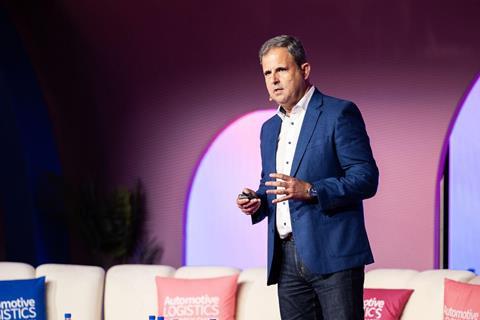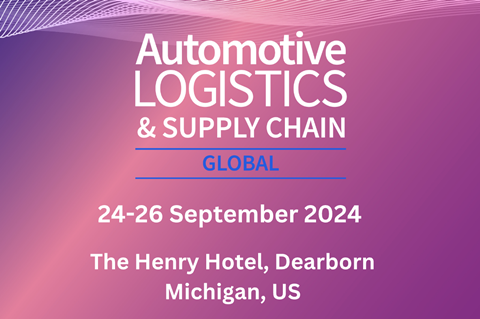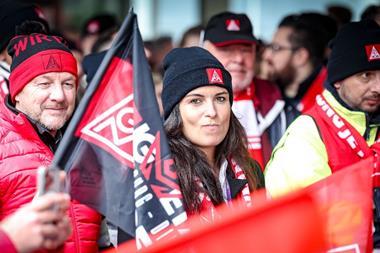VW Group of America is tackling the complexity of supply chain disruptions with a flexible matrix of strategies, including commodities multiple sourcing, multiple product assembly capabilities and a strong, resilient and diverse workforce.
At this year’s Automotive Logistics and Supply Chain Global conference in Dearborn, Paulo Monteiro, head of logistics for VW Group of America Chattanooga Operations, explained the carmaker’s flexible strategy for dealing with the sort of supply chain complexity that a litany of disruptive events has delivered to the automotive industry during and since Covid.

Monteiro listed three crucial factors in dealing with risk management. Risk mitigation through commodities multiple sourcing, multiple product assembly capabilities and a strong, resilient and diverse workforce.
Operations are complex enough at VW’s Chattanooga plant. Monterio outlined that production of the ID.4 electric vehicle (EV), alongside the Atlas seven-seater SUV and coupe version, involved managing 650 suppliers and 12 third-party logistics providers, which are transporting about 5.5m cu.m of material per year in across 75,000 truck deliveries and about 2,400 sea containers. He also pointed to in-plant logistics complexity which sees 151m internal pick and sequences.
“To do that, we use 265 pieces of hydrogen powered equipment, about 200 AGVs, and I’m proudly responsible for a great team of over 1,500 logistics employees that carry out this activity,” said Monteiro.
That level of logistics complexity does not need any spanners to be thrown in the works but there have been several thrown at the automotive supply chain over the last four years, which Monteiro summarised.
One event after another
The pandemic led to a complete freeze of manufacturing supply all over the world, followed by Texas storms that closed down major semiconductor plants (Infineon, NXP and Samsung Electronics) in the face of increased consumer demand for electronics. Then came the Ukraine war, which shut down some important tier suppliers for VW in Europe. Suppliers in North America were also hit by cyber-attacks. Since then, there have been further disruptions that have added what Monteiro referred to as “super extra complexity”, such as the grounding of the Evergreen container vessel in the Suez canal and more recently, Houthi attacks on container vessels in the Gulf of Aden, which has forced vessels around the Cape of Good Hope, adding transit time to international deliveries. Then there are the series of hurricanes that have been wreaking havoc to infrastructure in the US and the threat of port strikes on the US east coast, while currently in abeyance until January next year, continue to be a concern.
”All of these are events of extraordinary complexity, things that we have to deal above and beyond our normal job in logistics,” said Monteiro.
Depending on the category of the impact, either if it’s a supplier transport interruption or a catastrophic global event, we have a couple of different action items that we can try to use to mitigate those interruptions – Paulo Monteiro, VW Group of America
Multiple sourcing and production flexibility
So how to master that complexity and deal with disruption? According to Monteiro, that demands being flexible, gaining better visibility along the supply chain and maintaining connectivity.
Monteiro said that Chattanooga benefits from sourcing components from multiple suppliers and from making the ID.4 and Atlas versions in Europe and China, as well as the US, providing a guarantee of supply in the face of unforeseen disruption.
“The Chattanooga assembly line was also built in such a way that it can produce either petrol vehicles or EVs on the same assembly line,” said Monteiro. Given the current supply and demand issues affecting the EV market, VW has the capacity to produce on the Chattanooga assembly line exclusive production of internal-combustion-engine vehicles.
Monteiro outlined VW Group’s Supply Chain Interruptions Reaction Matrix for dealing with disruption, which identifies three courses of action for three categories of interruption: supplier impact, transport interruption and catastrophic global events.
“Depending on the category of the impact, either if it’s a supplier transport interruption or a catastrophic global event, we have a couple of different action items that we can try to use to mitigate those interruptions,” he explained.
They include production rescheduling, alternative and/or double sourcing and expedited shipments, the latter of which increased to around nine a day in 2023, which was necessary to keep assembly lines running at Chattanooga.
Tools for transparency
Greater visibility across the supply chain is also common sense and standard in the automotive industry today, according to Monteiro, and there are a range to tools to support this.
“We have all the track and trace standard tools,” he said. “We have our phones with mobile apps. We have ASN updates, not only from the suppliers, but from the transport companies, and this is also part of our digitalisation and transformation.”
There are also automatic updates from port authorities on container vessel unloading and the departure of the truck carrying that container from the port.
Maersk, provides automatic tracking by which VW Group can measure vessel performance and the same applies to expedited shipments. According to Monteiro, all of VW Group’s supply chain is currently monitored because this is basically the industry system standard in terms of connectivity.
Additionally, the company created a new Volkswagen AI Lab at the beginning of 2024, set up to be globally networked competence centre and incubator that will help the company identify new product ideas connected with AI and collaborate with tech companies as the need arises.
“We want to seek a new generation of digital products [and] seek tech companies’ collaboration,” said Monteiro, adding that it is a priority to capture new technology solutions wherever they are available and integrate them into VW Group’s supply chain management. Monteiro said the AI Lab is a product ideas generator and VW is integrating software to predict maintenance in production make changes in equipment that prevent downtime.
Monteiro also pointed to VW Group’s Electrify America network of more than 800 EV charging stations along major highways and cross-country routes in the US. He said VW Group is using AI also to improve the charging network.
“While we all continue to pursue AI as the next ‘fountain of eternal life’ we need to continue to rely in our logistics teams,” he said. “Attracting, retaining, coaching and developing them, including leadership, is the secret to success” – Paulo Monteiro, VW Group of America
Trusting in talent
However, there is one other factor in attaining better visibility and flexibility to deal with supply chain complexity and that is through closer and more inclusive collaboration with a diverse community of logistics professionals.
“We really believe that the diversity makes organisations stronger,” said Monteiro. “We have a mix of people, hired from outside [VW Group] together with those given opportunities from the shopfloor to grow up and develop, as happened to myself.” Monteiro said that diverse talent helped creating resilience through the collaboration and the experience that everyone needed to handle the daily challenges affecting the supply chain.
“While we all continue to pursue AI as the next ‘fountain of eternal life’ we need to continue to rely in our logistics teams,” he said. “Attracting, retaining, coaching and developing them, including leadership, is the secret to success.”

























![Global[1]](https://d3n5uof8vony13.cloudfront.net/Pictures/web/a/d/s/global1_726550.svgz)














No comments yet